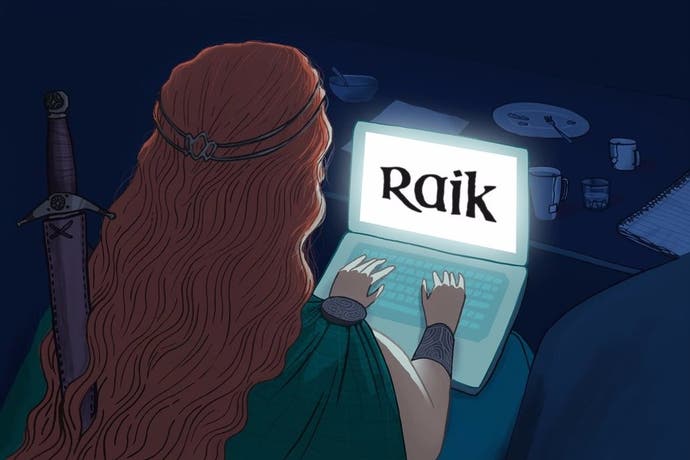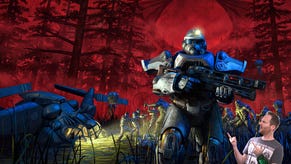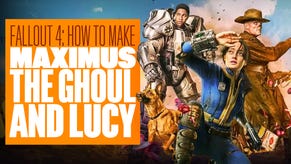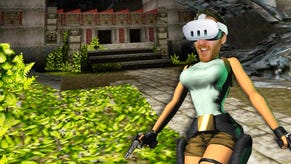Watch: Anxiety and video games - Low Batteries episode 4
A text interview with Raik's creator, too.
Anxiety disorders are the most common of all mental health problems. They're also - and I speak from experience here - rubbish to live with. Despite their prevalence, however, anxiety disorders are rarely discussed, partly because they make their sufferers feel like they have no place bringing them up in conversation.
In this episode of Low Batteries we explore some of the games designed to help anxiety sufferers and also take a look at remarkable twine game Raik. Raik has two stories that progress simultaneously, one written in English and the other in Scots. While the former is about a mythical warrior, the latter follows an office worker from Edinburgh as she tries to get through the day without having a panic attack.
Raik's creator, Aitch Giles, was kind enough to let me ask him a few questions about Raik's development. You can find them below the video, which I would recommend you watch first in order to get a real sense for what Raik is.
Eurogamer: What was your intention in creating Raik? Did you set out to educate people about what it's like to suffer a panic attack, was it designed to help suffers?
I think anxiety and panic are really individual experiences, and that they can manifest themselves in different people in very different ways. So I wasn't setting out to educate a general audience about a generalised experience of an anxiety, but to tell my own truth of it as accurately as possible: Raik is fiction, but all the thoughts and experiences the anxious character has are things I've thought and felt. But writing about your experience can be a good way for readers to understand their own -- and it's something Twine has been really good for in the last few years, with many writers sharing many different experiences of mental health. I've learned a lot about myself from reading other people's twines. I'm generally a bit mistrustful of folk who set out to educate and help others about mental health: too often that tends towards enforcing normative behaviours, rather than meeting people where they're at. But meeting other sufferers in solidarity, that's something I really believe in.
Eurogamer: How did the idea come about? Did you always imagine it having a split narrative?
Aye, I actually started with the idea of having a split narrative, and then started thinking about what stories it could tell well. When you live with more than one language or way of speaking in your head, especially when one of those is minoritised or marginalised, it can feel like you're living in two parallel worlds at the same time. And then I realised that that's also what anxiety can feel like: you're muddling through the day in astonishing psychic pain, and most of the people you meet haven't a clue. The world in your head and the world outside are completely different. So I set the whole split narrative up as a metaphor for anxiety on the one hand and Scottishness on the other.
Eurogamer: While playing through Raik I actually had a mild panic attack myself - you've done a remarkable job of getting across what it feels like to be suffering from anxiety - but the game isn't entirely without hope. Was it difficult to strike that balance? Were you ever tempted to pull some of the punches?
I'm really sorry to hear that! It was important to me to have a content note at the beginning of the game so that vulnerable folk could look after themselves during it. But aye, I wanted to get across a *really bad* day as clearly as I could. The day in the game is about as bad a day as I've ever experienced: I think a different, longer game could explore how moods can change and flow. Depression Quest has a good stab at that, tracking how depression can change over time. What I really wanted to do, though, is get across some of the absurdity and arbitrariness of panic. For example, there are false choices in the game where either one makes you panic more: that happens so much in daily life, and then you feel worse because you think you should have chosen differently, and so on. The systems and puzzles of Raik look like they're solvable, and sometimes they are -- sometimes you can deep breathe your way out of panic -- but sometimes they're deliberately unfair, because anxiety is unfair and unreasonable.
Eurogamer: The modern day portion of the game is written in Scots. Was there a particular reason you settled on that half of the game, rather than having the cave portion written that way?
There's a couple of things happening at once there. On the one hand, I wanted to find a way of making strange the mundane narrative of getting through an anxious day -- unfamiliar language can be a good way of making readers look at familiar things in a different way. It also means that many readers will have a weird, slugging time getting through that text, which is an analogue for how it can be to wade through an anxious day.
On the other hand, there's also a comment about Scotland and Scottishness going on there. Scotland is often set up as a bit of a mythical, fantastical place, and Scots as a hifalutin historical language. I wanted to make Scots feel both contemporary and ordinary. I also wanted to get something across about the fetishisation of Scotland: the cave crawl half is *absurd*, full of silly stereotypes of celtic fantasy. There's another layer of metaphor there going on about how folk with mental health probems are stereotyped and fetishised, as opposed to how they actually live and act. So there's a lot of binaries going on at once: Scots as vernacular, experiential, quotidian, difficult; English as distanced, stereotyping, fantstical, too easy. And both languages keep wanting to escape into each other.
Eurogamer: The modern day protagonist seems to have a grasp of some of the techniques used to battle anxiety - was it important to you to include those in this portion of the game?
I included them partly because it's narratively more interesting and partly because it's true to my experience: being anxious isn't just about being a victim of your brain (though it can feel like that) and never being able to escape (though it can feel like that), but also about this constant process of self-management. You're always pre-judging your decisions and trying to act in a way that keeps your anxiety in check. In that way, it can sometimes feel like a video game with insta-death and lots of unexpected threats - except it's unfair and there's no final victory. All that said, there's also an importance and bravery in works that depict uncompromisingly just how bad things can get, like I'm Fine and Anhedonia.
Eurogamer: Finally, what advice would you give to anxiety sufferers?
Everyone's different, and you can keep trying different things until you find what works for you. Whatever you need, that's what's right for you, no matter what other folk say or who they think you should be. Sometimes what you need will contradict all the sage advice: trust yourself. The top things that currently work for me are: doing stretches first thing each morning (but forgiving myself when I don't feel like it); taking two full days off work each week and damn the emails; being honest and open with the world about my mental health (but allowing myself to lie when I need to); and spending time with folk who love and support me unconditionally, regardless of how weird my brain is making me behave.
----------
If you think you or someone you know may be suffering, don't carry on in silence.
In the UK:
You can call the Rethink advice and information service on 0300 5000 927 (10am-1pm).
Also the Depression Alliance, a charity, has a network of self-help groups.
Samaritans offers a 24-hour confidential helpline: 116 123
In Australia:
You can contact the BeyondBlue support service in 1300 22 4636
In the US:
You can call the Crisis Call Center on 1-800-273-8255 at any time of the day.
If you're more comfortable talking via text than on the phone, 7cupsoftea.com offers an anonymous chat service.










